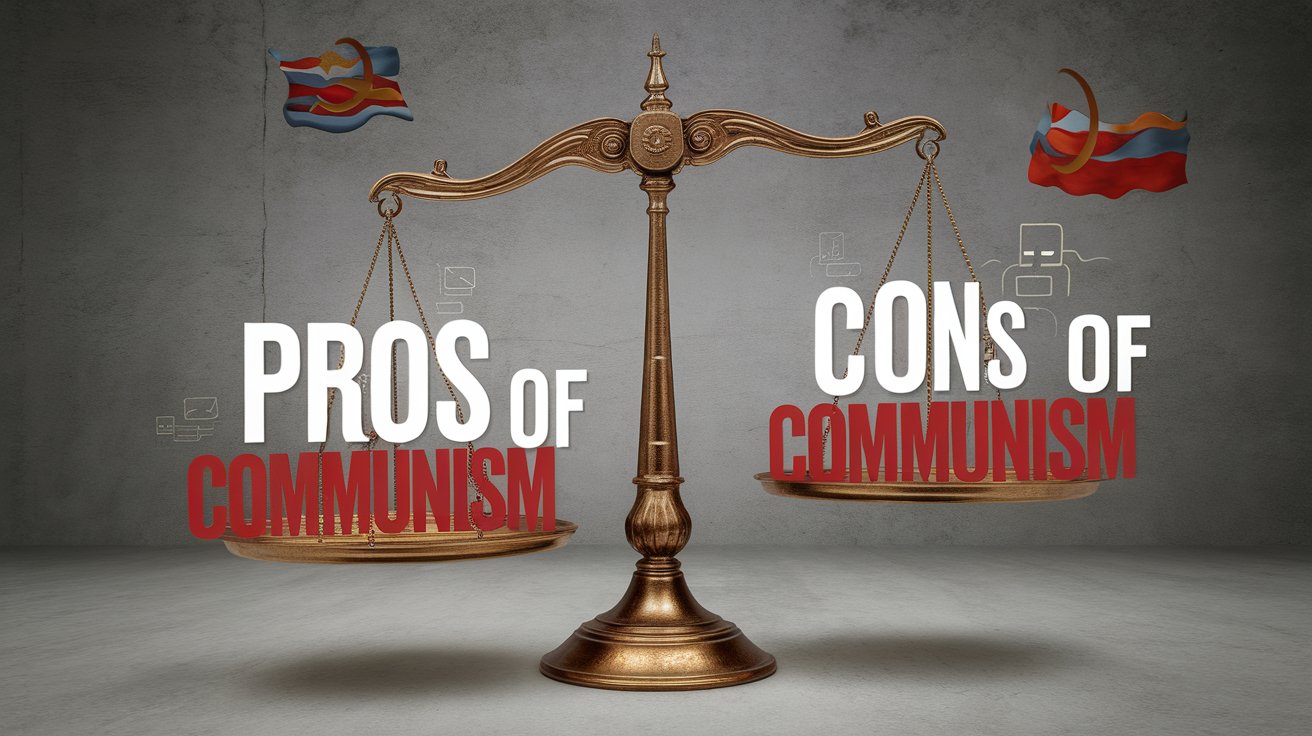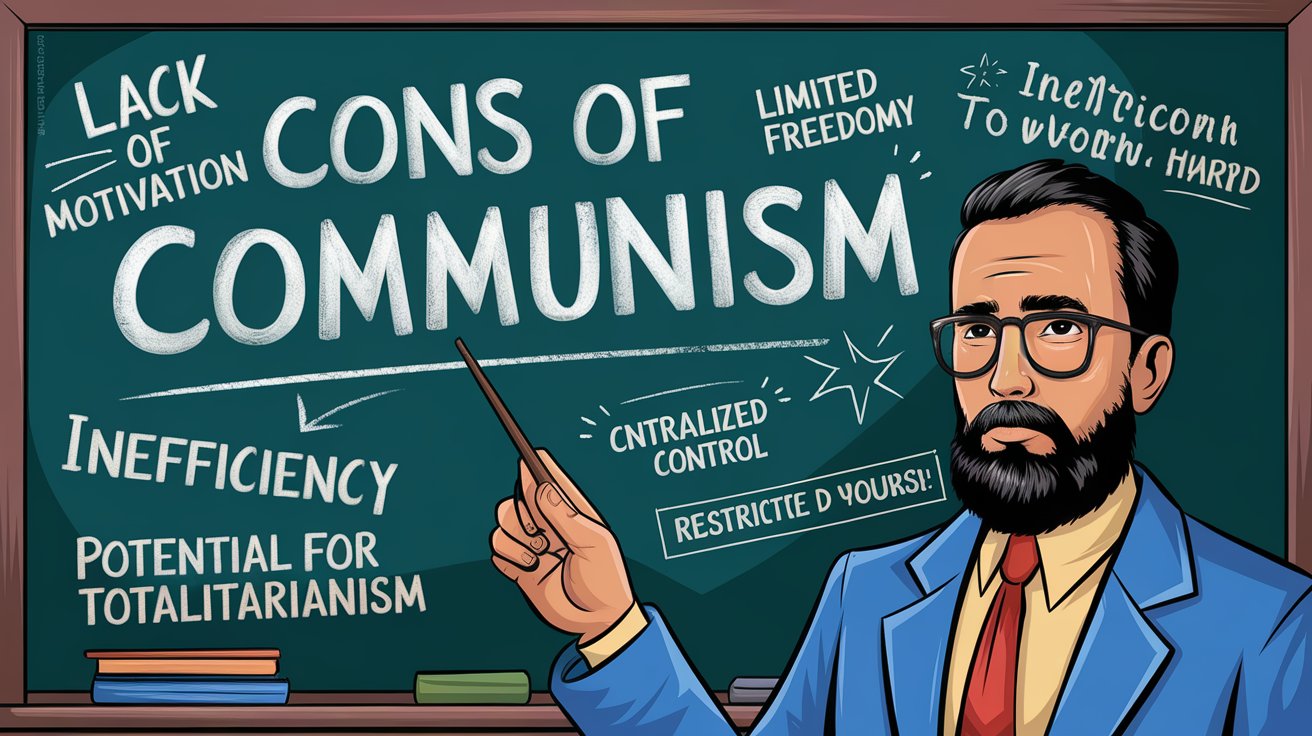
Communism is a political and economic ideology that advocates for the collective ownership of the means of production to create a classless society where wealth is distributed according to need.
Originating from the works of Karl Marx and Friedrich Engels, communism seeks to eliminate the disparities between the rich and the poor by abolishing private property and centralizing economic control.
Understanding the pros and cons of this ideology is crucial for evaluating its historical and contemporary relevance, especially as it has shaped the political landscape of various countries.
Pros of Communism

One of communism’s fundamental goals is to create a society without class divisions.
By redistributing wealth and resources, communism ensures that no individual or group has significantly more than others.
The idea is to level the economic playing field and eliminate the vast income disparities in capitalist societies.
- No class-based society: Communism seeks to remove the distinction between the wealthy elite and the working class.
- Redistribution of wealth: In a communist system, wealth is shared among all citizens, preventing extreme poverty or wealth concentration.
2. Full Employment
Communism is designed to ensure that everyone has a job and contributes to the collective economy.
The government plays a central role in assigning jobs based on society’s needs and individuals’ abilities.
This eliminates the risk of unemployment, a significant problem in capitalist economies.
- Guaranteed employment: The state controls all industries and ensures everyone has a role in society.
- No competition for jobs: Jobs are allocated based on skills and societal needs rather than market demand.
3. Access to Basic Needs
A key principle of communism is that everyone should have equal access to essential services like education, healthcare, and housing.
In theory, this ensures that no one is left behind and that basic human needs are met for all citizens, regardless of their social or economic status.
- Universal healthcare: Healthcare is provided to all citizens without cost.
- Free education: The state guarantees free education to promote equality of opportunity.
- Guaranteed housing: Everyone is entitled to shelter, and the state ensures housing is available.
4. Centralized Planning
In a communist system, the government controls the economy and makes all production, resource allocation, and distribution decisions.
This centralized approach is meant to prevent the wastefulness of capitalism and ensure that resources are used efficiently to meet society’s needs.
- Resource management: Centralized control can lead to efficient use of resources, avoiding overproduction or underproduction.
- Focus on collective goals: Economic decisions are made based on the needs of society, not profit motives.
Cons of Communism

1. Lack of Personal Freedom
Communism often leads to restrictions on individual freedoms, as the state controls many aspects of life, including employment, property ownership, and even personal choices.
This lack of autonomy can create dissatisfaction among citizens who feel they have little control over their lives.
- Restricted choices: Individuals may not have the freedom to choose their profession, location, or lifestyle.
- Suppression of dissent: Criticism of the government or the system is often not tolerated in communist regimes.
2. Inefficiency in Economic Management
While centralized planning is intended to create efficiency, it can often result in the opposite.
Without competition and market incentives, communist economies can become stagnant, leading to shortages, inefficiencies, and poor resource management.
- Lack of innovation: Without competition or financial incentives, there is little motivation for innovation or improvement.
- Bureaucratic inefficiencies: Centralized control can lead to slow decision-making and mismanagement of resources.
3. Authoritarianism
Communist governments have historically been associated with authoritarian rule, where power is concentrated in the hands of a few leaders.
This has often led to oppressive regimes that suppress political dissent and limit democratic freedoms.
- Concentration of power: In practice, communist governments have often devolved into authoritarian states.
- Limited political freedom: Dissent is usually met with severe punishment, and opposition parties are often banned.
4. Limited Incentive for Hard Work
One of the major criticisms of communism is that it removes the incentive for individuals to work hard or innovate.
Since resources are distributed equally regardless of effort, people may lack the motivation to excel, leading to a decline in productivity and creativity.
- Equal rewards: Hard work and innovation may go unrewarded, as everyone receives the same benefits.
- Decline in productivity: Without personal incentives, overall economic productivity may suffer.
Historical Context of Communism

Countries like the Soviet Union, China, and Cuba have implemented communist systems with varying results, reflecting both the promises and pitfalls of the ideology.
- Soviet Union: The USSR exemplified both the pros, such as full employment and industrial growth, and the cons, including authoritarianism and economic stagnation. The collapse of the Soviet Union in 1991 highlighted the inefficiencies of a centralized economy.
- China: While China began as a purely communist state, its economy has since incorporated capitalist elements. It showcases the adaptability of communist principles in a modern context, but it still faces criticism for authoritarian rule.
- Cuba: Despite its successes in healthcare and education, Cuba’s communist system has struggled with economic inefficiency, limited personal freedoms, and a lack of innovation.
Conclusion
Communism offers both advantages and disadvantages, ranging from economic equality and universal access to basic needs, to the lack of personal freedom and economic inefficiency.
While the ideology promotes fairness and shared resources, its implementation has often led to authoritarianism and stagnation.
Ultimately, the success or failure of communism depends on various factors, including leadership, economic management, and global context.
Understanding both sides of the debate is crucial for anyone considering the broader implications of this ideology.

